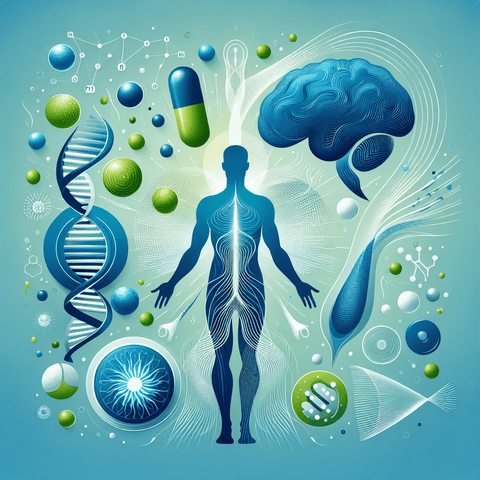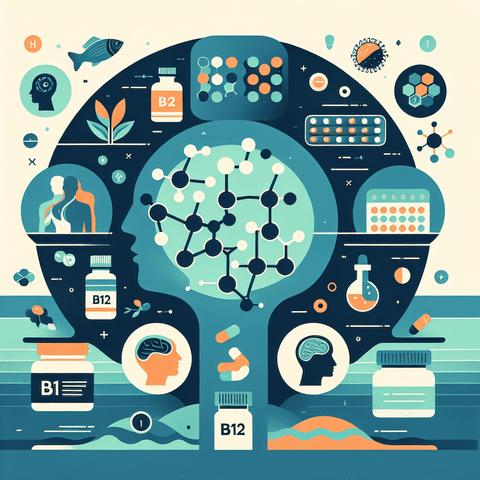Introduction: Why Vitamin B12 Matters in Your Nutritional Supplement Routine
In the complex ecosystem of our body's nutritional needs, vitamins serve as the critical foundation of optimal health. Among these, vitamin B12—also known as cobalamin—stands out for its profound and diverse roles in energy metabolism, neurological function, and DNA synthesis. As awareness around holistic wellness continues to grow, so does the acknowledgment of how indispensable B12 is to your daily nutritional routine. While we may associate vitamins broadly with general well-being, vitamin B12 carries unique responsibilities that no other nutrient can fully replicate. This makes it a vitamin worth knowing in-depth—particularly for those managing modern-day stress, dietary restrictions, aging, or health goals like increased energy and cognitive focus.
Unlike some other vitamins readily available in a variety of plant and animal foods, vitamin B12 is primarily derived from animal-based dietary sources. This narrow dietary availability renders certain populations—such as vegans, vegetarians, older adults, and individuals with particular medical conditions—more susceptible to deficiency. Consequently, supplementation becomes not merely a convenience but a necessity.
This comprehensive blog post will explore why vitamin B12 is one of the most vital nutrients in your supplement cabinet. We'll dive into its significance for energy, mental function, and long-term health—and perhaps most importantly, how to ensure you're getting enough of it. From absorption mechanisms to product selection, we’ll guide you through everything you need to know about this powerhouse vitamin and how it fits into a well-balanced health regimen.
Vitamin B12 and Nutritional Supplements: Essential for Energy and Vitality
Vitamin B12 plays a central role in maintaining optimal energy levels and overall metabolic function. This micronutrient is instrumental in the conversion of food into glucose, the fuel that powers cellular activity across every tissue in the body. However, because vitamin B12 cannot be produced by the human body, it needs to be obtained through diet or supplementation. When dietary intake is insufficient, people often turn to nutritional supplements to fill the gap—and with good reason.
Among regular supplement users, vitamin B12 holds a prominent place, particularly for those seeking improved energy and heightened physical performance. In fact, many people find that adding B12 to their supplement regimen coincides with restored vitality and reduced daily fatigue. The popularity of B12 supplementation is further bolstered by its non-toxicity and water-soluble nature, reducing the risk of overdose or harmful accumulation.
B12 supplements are available in several convenient forms. The most common include:
- Oral Tablets or Capsules: These are easily found at health stores or online. They often combine B12 with other B-complex vitamins or multinutrients, supporting synergistic health outcomes.
- Sublingual Tablets or Drops: Designed for absorption under the tongue, these can bypass the digestive tract, which is particularly useful for individuals with impaired gastrointestinal function.
- Intramuscular Injections: Often prescribed in clinical settings for those with severe deficiencies, these deliver immediate and direct B12 replenishment.
For people looking to incorporate vitamin B12 into a comprehensive wellness plan, selecting the right supplement is just as important as acknowledging its necessity. Those who adhere to plant-based diets or experience chronic fatigue would benefit most by ensuring consistent supplementation. You can explore quality B12-inclusive options or complementary nutrient categories like magnesium for energy and vitamin C for vitality.
Whether you're enhancing a current routine or starting anew, vitamin B12 stands as a pillar of energy and vitality in your daily supplement plan. Ensuring the right dosage, form, and product quality is essential for obtaining maximal benefits, especially when deficiencies come into play. Let’s next explore how you can recognize when your body might actually be needing more vitamin B12.
Vitamin B12 Deficiency Symptoms: Recognizing When You Need Supplementation
Vitamin B12 deficiency can manifest subtly at first, but over time, it may lead to serious health complications, especially if not recognized and addressed early. The body is quite adept at compensating for declining nutrients—so much so that symptoms of a deficiency often appear only after B12 stores have been depleted significantly. Recognizing these signs is crucial for timely intervention and for choosing the right supplementation strategy.
Common symptoms linked to vitamin B12 deficiency include:
- Persistent fatigue and weakness
- Pale or jaundiced skin
- Tingling sensation in the hands or feet (peripheral neuropathy)
- Impaired memory and difficulty concentrating
- Mood changes, including depression or irritability
- Glossitis (inflamed tongue), mouth ulcers
- Poor balance or coordination
Because B12 has a profound impact on the nervous system and red blood cell production, its deficiency affects both physical and mental functioning. In extreme cases, chronic deficiency can lead to irreversible neurological damage or megaloblastic anemia. Certain population groups are particularly prone to B12 deficiency, including:
- Vegans and Vegetarians: As B12 is naturally found in animal products, plant-based diets often fall short unless fortified foods or supplements are included.
- Older Adults: With age, gastric acid production declines, making it harder to extract B12 from food.
- Individuals with Digestive Disorders: Conditions such as celiac disease, Crohn’s disease, or gastric bypass surgery can impair B12 absorption.
- Those Taking Specific Medications: Long-term use of proton pump inhibitors, metformin, or antacids may interfere with B12 absorption.
Before starting supplementation, it's crucial to confirm a deficiency through proper medical testing. A simple blood test measuring serum B12 levels can offer insights, but sometimes, additional checks such as methylmalonic acid or homocysteine tests are required for clarity. Once a deficiency is confirmed, a healthcare professional can recommend appropriate forms and dosages tailored to your specific needs.
Preventing deficiency through proactive supplementation is often more effective than treating its symptoms later. This makes it imperative for individuals in high-risk groups to consider vitamin B12 as part of their nutritional supplement routine. If you’re unsure where to start, exploring high-quality B12 products or synergistic nutrients—like those available in multivitamins or vitamin D formulations—can provide a well-rounded approach.
B12 Energy Boost: Enhancing Your Daily Vitality with Proper B12 Intake
One of the most commonly touted benefits of vitamin B12 is its ability to promote energy—an advantage that permeates both scientific literature and everyday wellness discussions. But how does it work at a biological level?
Vitamin B12 plays an essential role in cellular energy production as it serves as a cofactor in several key enzymatic reactions, particularly within the mitochondria—the “powerhouse” of the cell. B12 is essential for converting the macronutrients (carbohydrates, fats, and proteins) we eat into usable energy. Specifically, it helps convert methylmalonyl-CoA into succinyl-CoA, a critical step in the Krebs cycle, which is central to ATP (cellular energy) production.
Scientific evidence supports the notion that B12 deficiency can lead to fatigue, reduced exercise capacity, and overall low vitality. While supplementation in non-deficient individuals does not necessarily boost energy beyond natural baseline levels, it does help optimize energy metabolism when deficiency is present or suspected.
Tips to enhance energy through B12 supplementation include:
- Timing: Take your B12 supplement in the morning or during times of activity for best energy-enhancing effects.
- Pairing with Other Nutrients: Combine with magnesium for muscle and energy support or vitamin C to support antioxidant protection.
- Diet Plus Supplement: Maintain a balanced diet with B-complex vitamins to support synergistic energy pathways.
Many users of B12 supplementation report a regained sense of alertness and stamina, particularly following correction of deficiencies. However, it’s essential to note that B12 is not a stimulant like caffeine—it doesn’t artificially increase energy levels but instead supports the body’s own capacity to produce it efficiently.
Whether aiming to overcome fatigue, recover from illness, or improve athletic performance, adequate B12 intake remains a cornerstone of any energy-focused health strategy. Combining this approach with proper sleep, physical activity, and stress management ensures long-lasting stamina and well-being.
Vitamin B12 Absorption: Ensuring Your Body Gets What It Needs
Absorbing vitamin B12 efficiently is just as important as consuming it. The process is more complex than for many other vitamins. It requires a functioning digestive system and the presence of several other biological factors. When these mechanisms are compromised, so is B12 absorption—which can lead to deficiency despite adequate intake.
Here’s how B12 is typically absorbed:
- B12 from food is released in the stomach via hydrochloric acid and binds to haptocorrin.
- In the small intestine, haptocorrin is digested and B12 binds to intrinsic factor (a protein secreted by stomach cells).
- The B12-intrinsic factor complex is absorbed in the ileum (last part of the small intestine).
Factors that influence or impair B12 absorption include:
- Age: Reduced stomach acid and intrinsic factor production in older adults inhibit B12 release from food.
- Gastrointestinal Conditions: Conditions like gastritis, IBS, or surgical alterations can reduce absorption pathways.
- Medications: Long-term use of metformin or acid-reducing drugs can limit B12 uptake.
Fortunately, specific strategies can improve absorption:
- Sublingual Administration: B12 drops or tablets absorbed under the tongue bypass the need for intrinsic factor.
- Methylcobalamin Form: This bioavailable form is believed to be more easily utilized by the body.
- Paired Nutrients: Vitamins like B6 and folate can synergize with B12 in metabolic pathways.
Some individuals may be advised to pursue high-dose supplements or occasional injections depending on severity of malabsorption. Working with a healthcare practitioner ensures a personalized approach that aligns with your unique health status and lifestyle.
B12 Neurological Health: Protecting Your Brain and Nervous System
Arguably, one of the most critical roles of vitamin B12 is its contribution to neurological and cognitive health. The nervous system depends on this vitamin for proper functioning, including the development and maintenance of the myelin sheath—a protective layer surrounding nerves. Without sufficient B12, these nerve coatings can degrade, leading to potential damage.
Deficiencies, especially when prolonged, can produce symptoms such as:
- Paresthesia (tingling sensations in extremities)
- Loss of balance and coordination
- Memory lapses and cognitive decline
- Visual distortions or optic neuropathy
One of the more alarming consequences of untreated B12 deficiency is its association with neurodegenerative diseases. Studies have linked low B12 levels with increased homocysteine, a marker associated with Alzheimer's disease, dementia, and cardiovascular risk. Regular supplementation and monitoring can help mitigate these risks by supporting methylation processes and lowering homocysteine levels.
Even among individuals without significant deficiency, ensuring optimal B12 levels can support mood stability and focus. While more research is needed for conclusive claims, there is growing evidence that B12 is correlated with improved mental clarity and emotional resilience. Those prioritizing brain health may also find support through synergistic nutrients such as DHA and EPA Omega-3 supplements, known for their neuroprotective roles.
Incorporating B12 into a brain support strategy is especially critical for aging populations, individuals recovering from illness, and those under chronic stress. Neurological damage from B12 deficiency is often reversible in early stages—but prevention is always better than cure.
Vitamin B12 Supplements: Choosing the Right Product for Your Needs
Not all vitamin B12 supplements are created equal. Choosing the right formulation is crucial for absorption, efficacy, and compatibility with your health goals. The three most commonly available forms include:
- Cyanocobalamin: A synthetic, stable, and widely available form of B12. It is less expensive and shelf-stable, but requires conversion in the liver to become active.
- Methylcobalamin: A bioactive form that’s readily used by the body. It’s often favored for those with genetic conditions affecting methylation (e.g., MTHFR mutations).
- Hydroxocobalamin: Often administered intravenously or via injection, this form is great for sustained action and is commonly used in clinical settings.
When selecting a B12 supplement, consider these factors:
- Dosage: Typical supplemental doses range from 250 mcg to 1000 mcg daily. Higher doses may be warranted in cases of deficiency under professional supervision.
- Form: For those with absorption issues or gastrointestinal disorders, sublingual or injectable forms may be more effective.
- Synergy: B12 often works best alongside folate, vitamin B6, and other co-factors. Consider B-complex supplements to capture these synergies.
At Topvitamine.com, you can explore a curated range of nutritional products personalized to energy, immune function, and neurological support—including B12-inclusive B-vitamin complexes or energy-based formulations synergizing with vitamin C and magnesium.
Final Thoughts: Maximizing the Benefits of Vitamin B12 Through Smart Supplementation
Vitamin B12 is an irreplaceable component of human health—spanning domains of metabolic energy, mental clarity, and long-term neurological protection. From helping fight fatigue to reducing peripheral nerve damage and supporting brain integrity, the breadth of B12’s benefits highlights why it belongs in every thoughtful wellness routine.
However, as with all supplements, it's important to proceed with an informed, evidence-based approach. Get tested when in doubt, choose high-quality products, and prioritize forms aligned to your lifestyle and health status. Pairing B12 with other supportive nutrients and tailoring your intake can go a long way toward maintaining vitality through the years.
Be proactive, be informed—because you deserve to function at your metabolic best. Consider vitamin B12 as both a foundational nutrient and a strategic supplement to anchor your health journey.
Q&A Section
- How do I know if I'm deficient in vitamin B12?
- B12 deficiency is confirmed through blood tests. Symptoms like fatigue, tingling, and brain fog may indicate low levels, especially in at-risk groups such as vegans or older adults.
- Can B12 supplements help with fatigue?
- Yes. B12 supports energy metabolism. In those with a deficiency or suboptimal levels, supplementing can reduce fatigue and increase alertness.
- Which form of B12 is best?
- Methylcobalamin is the active form of B12 and may be better absorbed in people with digestion or methylation issues, although cyanocobalamin remains stable and effective for general use.
- Should I take B12 alone or in combination with other vitamins?
- B12 works best when taken in conjunction with other B vitamins. B-complex formulations or multivitamins ensure you get additional support from other nutrient cofactors.
- Is it safe to supplement with high doses of B12?
- Vitamin B12 is water-soluble, and excess is typically excreted through urine. However, always consult a healthcare provider before starting any supplement, especially for chronically high dosages.
Important Keywords
- vitamin B12 benefits
- B12 energy production
- B12 deficiency symptoms
- neurological health and B12
- best B12 supplement
- how is B12 absorbed
- methylcobalamin vs cyanocobalamin
- supplementing B12 for energy
- vitamin B12 and brain health
- topvitamine B12 supplements



